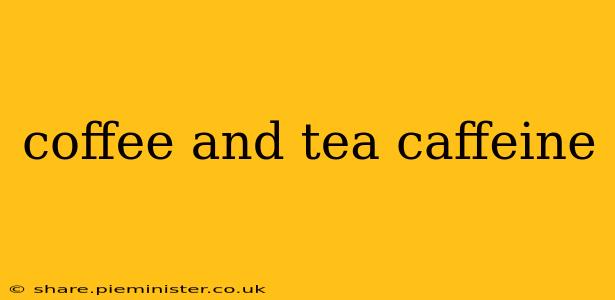Coffee and tea. Two of the world's most beloved beverages, both boasting the stimulating effects of caffeine. But how do these popular drinks stack up against each other when it comes to their caffeine content? Understanding the differences can help you make informed choices about your daily caffeine intake. This comprehensive guide delves into the caffeine levels of coffee and tea, exploring various factors influencing their potency and addressing frequently asked questions.
How Much Caffeine is in Coffee vs. Tea?
The caffeine content of both coffee and tea varies significantly depending on several factors. Let's break it down:
Coffee: A typical 8-ounce cup of brewed coffee contains anywhere from 80 to 170 milligrams (mg) of caffeine. This range is vast because several factors influence the final caffeine amount:
- Bean type: Arabica beans generally have less caffeine than Robusta beans.
- Roast level: Darker roasts often have slightly less caffeine than lighter roasts, although the difference is usually minimal.
- Brewing method: Espresso contains more caffeine per ounce than drip coffee, while French press coffee often has a higher caffeine concentration than other brewing methods.
- Bean grind size: Finer grinds can extract more caffeine.
Tea: The caffeine content of tea is considerably lower than coffee, typically ranging from 14 to 61 mg per 8-ounce cup. Again, various factors influence the caffeine levels:
- Tea type: Black tea generally has more caffeine than green tea, white tea, or oolong tea.
- Brewing time: Steeping tea for longer periods will extract more caffeine.
- Tea leaf quality: The quality and type of tea leaves can influence caffeine concentration.
What are the Differences in Caffeine Effects?
While both coffee and tea contain caffeine, their effects can differ slightly due to the presence of other compounds. Tea, for instance, often contains L-theanine, an amino acid that can promote relaxation and reduce anxiety, potentially offsetting some of the jittery effects associated with caffeine. Coffee, on the other hand, tends to deliver a more immediate and intense caffeine boost. This doesn't mean one is inherently better than the other; it simply highlights that the overall experience can be subtly different.
Is Decaf Coffee or Tea Caffeine-Free?
No, decaf coffee and tea are not entirely caffeine-free. The decaffeination process removes the majority of caffeine, but some residual caffeine remains. Expect significantly lower caffeine levels in decaf versions—typically less than 3 mg per cup.
Which has More Caffeine: Coffee or Tea?
Coffee consistently contains significantly more caffeine than tea. While the exact amount varies depending on the factors listed above, a standard cup of coffee will almost always have a higher caffeine content than a standard cup of tea.
Does the Type of Tea Matter?
Yes, the type of tea significantly influences its caffeine content. Black tea generally contains the most caffeine among the common tea types, followed by oolong tea, green tea, and then white tea. Herbal teas, which are not technically teas (they don't come from the Camellia sinensis plant), generally contain very little to no caffeine.
How Can I Reduce Caffeine Intake from Coffee and Tea?
Several strategies can help you moderate your caffeine consumption:
- Drink smaller portions: Opt for smaller cups of coffee or tea.
- Choose lower-caffeine options: Select decaf varieties, Arabica beans, or lighter roasts for coffee; choose green or white tea over black tea.
- Reduce brewing time: Steep tea for shorter periods.
- Dilute your drinks: Add water or milk to lessen the caffeine concentration.
Ultimately, the "better" choice between coffee and tea depends entirely on individual preferences and tolerance levels. Understanding the nuances of caffeine content in both beverages allows for a more informed and enjoyable caffeine experience.
